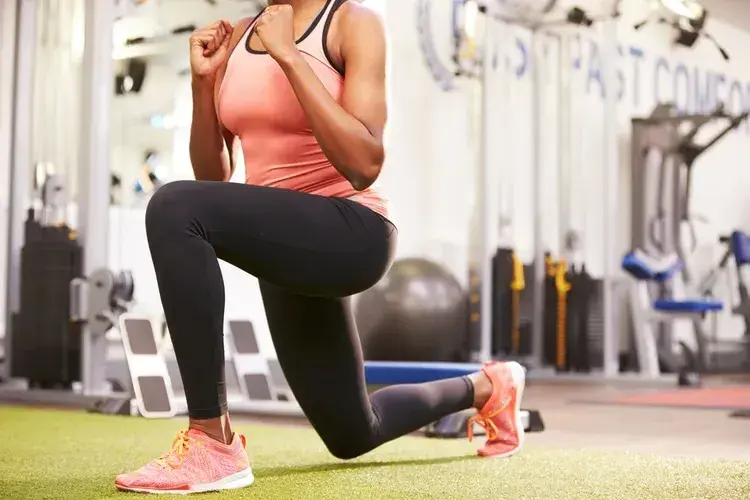7 min read
Are You Gaining Weight Even Though You’re Exercising?
Garcia Weight Loss
:
Aug 2, 2019 12:00:00 AM

/assets/images/provider/photos/2580021.jpg)
We all know exercise is hard work. You have to find the time, energy, and motivation to push your body physically. But there’s plenty of evidence that shows that the hard work of exercise is well worth it for both physical and mental well-being.
That’s why it can be frustrating if you’ve been sticking to an exercise plan but the number on the scale isn’t budging. After all, shouldn’t weight loss be a natural result of burning calories from exercise?
But exercise and weight-loss have a surprisingly complex relationship. Indeed, simply exercising every day is not a guarantee that a person will lose weight.
Fortunately, there are ways to make exercise work for you, for both the health benefits and for weight loss. Here’s what you need to know.
Exercise alone isn’t usually enough
Everyone should be exercising because it’s great for your mind and body. But it’s not a magic weight-loss solution on its own, especially if you don’t make any other lifestyle changes.
Because many types of exercise don’t burn that many calories, losing weight with exercise alone can be a slow and frustrating process. While you may burn a couple of hundred extra calories during exercise, you may inadvertently eat more at your next meal, negating any calories you burned off.
Making dietary changes in addition to exercise, however, is a successful strategy for noticeable weight loss. If you focus on eating more anti-inflammatory foods and moving more, you’ll probably find that the weight comes off quicker and with a little less effort.
These diet changes don’t always have to be major. In fact, making some small but significant changes could be the perfect complement to exercise because you’ll lose weight and feel great while doing it.
Start by cutting out or cutting back on sugars and processed foods, which are nutritionally lacking and adding excess calories you simply don’t need.
Replace these foods with fresh, whole fruits and vegetables. You’ll increase your fiber intake as well as your intake of essential vitamins and minerals. You’ll also cut back on unhealthy refined carbohydrates, which can cause blood sugar levels to drop and energy levels to plummet.
Of course, everyone’s body is different. Things like our genetics and DNA, our health history, and any food allergies or sensitivities all play a role in determining our best diet plan. Therefore, evaluating all of these factors is an important step toward healthy weight loss that lasts.
DNA can not only affect which foods will help you lose weight and which ones to avoid, but it can also have an impact on how your body responds to exercise. That’s why knowing your DNA profile before you start your diet and exercise plan can be a game-changer. Consider a DNA test like the Vivaliti DNA program, which is designed to set you up for weight-loss success.
The danger of drinking calories
Many people who exercise regularly consume sports drinks, shakes, and other beverages to get a quick meal or to stay hydrated. But this practice of drinking excess calories can make it difficult to lose weight.
Sports drinks contain sugar and calories you simply don’t need. Energy or muscle building shakes are often high in calories. This isn’t necessarily a bad thing on its own, but studies show that drinking calories does not satisfy hunger. This means you could wind up eating more because you’re so famished after a workout and all you had to “eat” is a shake.
Cut back or eliminate alcohol
Alcoholic beverages are not only high in calories, but they force your body to focus on breaking down the alcohol instead of food and fat.
Although the recommended amount of alcohol is no more than one drink per day for women and two drinks for men, this amount may be far too much for people trying to lose weight. Alcohol also offers no nutrition and taxes your liver, which hurts your detox efforts as well.
If you find that you’re not losing weight even though you’re exercising and eating well, alcohol could be to blame.
Load up on water
Many people underestimate how much water they need, especially if they are exercising. Water is vitally important for weight loss, and your body needs a lot if you’re working out. Don’t assume that the amount you drank every day before you started an exercise program is still acceptable. Chances are, you need to drink much more if you’re getting exercise.
Drinking more water could be an effective change if you find that you’re exercising but not losing weight. Here’s why:
- If you’re not well hydrated, you could mistake thirst for hunger and eat more without realizing it.
- Being dehydrated can deplete your energy levels, so you won’t be at your best when you exercise. You might not be able to work out as hard or as long as you like.
- Dehydration can slow down your digestion, making you feel bloated and sluggish. This can make exercise difficult or uncomfortable. It can also make your belly look bigger.
How do you know if you’re getting enough water? There is no set amount that’s perfect for everyone, as it depends on many factors such as body weight and activity level. Keep an eye on the color of your urine. A pale yellow or almost clear color is usually ideal. If it’s dark, you’re dehydrated.
Be careful with rewards
You deserve a pat on the back for sticking with an exercise plan! But it’s best to reward yourself with things that are calorie-free. Just one slice of cake or a bagel could easily send you over your calorie needs for the day, even if you had a great workout. So while you’ve treated yourself, you’ve also undone all your hard work.
Instead, reward yourself with something that’s not food-based. A new outfit for the gym, downloading some new workout music, or a hot bath are great ways to feel proud of your efforts without undoing your hard work. Another way to automatically reward yourself is to keep track of your progress is to keep a fitness diary, on paper or electronically. You can see your achievements and milestones as you go, and feel great about how far you’ve come.
Don’t sacrifice sleep
Are you getting up an hour earlier than normal to get to the gym each day? That’s great — but not if you’re only getting five hours of sleep each night.
A lack of sleep can make it difficult to lose weight because it disrupts your body’s hunger and fullness hormones. So even if you’re burning off calories at the gym in the early morning hours, your lost sleep could be making you hungrier, hurting your ability to burn fat, and zapping your energy so your workout ends up being a flop.
Why excessive exercise won’t help
If a little exercise is good for you, then a lot must be great for you, right?
When it comes to exercise, more is not always better. Whether you do cardio like running or biking, or weight training or resistance exercise, your body needs some recovery time in between sessions to be at its best. If you’re overtraining, you could be pushing your body to its limits — and hurting your weight-loss efforts in the process.
Too much exercise and cortisol
Exercising at a very difficult level every day without adequate rest in between sessions could actually cause you to gain weight or at the very least, hit a plateau. Overtraining, especially when doing hard-core cardio exercise like running long distances, changes some important hormonal balances in your body. Namely, it raises levels of the stress hormone cortisol, which can cause weight gain.
Cortisol affects many body processes, and high levels can cause blood sugar levels to rise. It can also increase levels of ghrelin, the hunger hormone. A rise in cortisol is the body’s natural “protection” response when it senses that you’re stressed — and a hard workout day after day was a classic sign of stress in our ancestors who had to hunt and forage for food.
These high cortisol levels can cause your body to hold on to belly fat, which is not only detrimental to your health, but is particularly frustrating when you expect to see your waistline shrinking.
Hard exercise = major hunger
We’ve all felt that grumble of hunger after exercise. It’s a natural instinct for the body to want to put back some of the calories it just used. It’s been a part of our survival for thousands of years.
Elite athletes know how to make this work for them. They have personal trainers and strict dietary rules that help them get into amazing shape without eating too many calories.
But if you’re overtraining without a specific dietary program in place to help your body recover and get the nutrients it needs, you’re likely going to be very, very hungry. It will be difficult — if not impossible — to ignore those powerful hunger signals when you’re exercising so hard day after day. This could set you up for failure if you end up consuming more calories than you just burned, which is easy to do.
While calories burned vary widely from person to person, a 180-pound person may burn about 150 calories per mile when running. If you run 3 miles, that’s 450 calories. If you weigh less, you’ll probably burn even fewer calories than this. And one extra post-workout snack could put all those calories back if you’re not extremely careful.
How to avoid overtraining
If you think you might be exercising too hard, you can take these steps to give your body recovery time, helping you feel better and lose weight:
- Don’t do the same activity, like running, every day. Keep difficult cardio workouts to every other day (at the most!). In between, do something that’s lower intensity, such as walking or weight training.
- Use exercise to relieve stress. Yoga is a great stress reliever and can help with strength and flexibility, too. Add this into your routine in place of a high-intensity cardio session.
- Alternate muscle groups. Strength training should make you a little sore afterward. This is because your muscles get tiny tears in them as you work them, allowing them to build themselves into a stronger, leaner version as they heal. Wait for those muscles to recover before you work them again. This is simple to do: work lower body one day, and upper body or abs the next. Don’t work those same muscles again if they’re still sore.
Get stronger and forget about numbers
Having strong, lean muscles is one of the keys to long-lasting weight loss. To do this, you need to do strength training.
Strength training does not mean you have to do hard core weight lifting or build major muscle bulk. On the contrary, strength training can be done even without a set of weights. Exercises like push-ups, leg lifts, and other resistance techniques can build lean muscle.
This lean muscle helps you keep weight off over the long term. Muscle burns more calories than fat, even at rest, so the more muscle you have, the more fat your body can burn.
Many people get frustrated with strength training because the number on the scale isn’t moving. But because muscle weighs more than fat, you may not see your weight decreasing on the scale. Instead of worrying about this number, take a look at your body’s shape, how your clothes fit, and how you feel. These things all change for the better when you build more muscle and lose fat, even if the number you think you should weigh doesn’t match what you see on the scale.
Are you ready to lose weight and get healthier, but need some extra help to meet your goals? Garcia Weight Loss and Wellness Centers offers customized weight-loss plans that are designed to work for people as individuals — not one-size-fits-all programs. Contact us today for your no-cost consultation!


